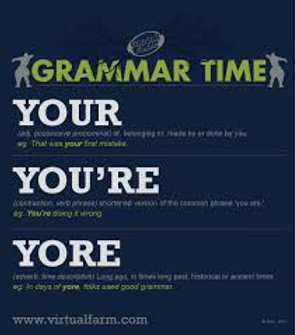The best evidence of the deterioration of quality in our society is, in my view, the misuse of your. Ladies and gentlemen, your is an adjective, not a noun or pronoun. It is a possessive adjective. And, being possessive, it gets offended, even jealous, when you use it in a way that it’s not supposed to be used. Its misuse as a pronoun instead of an adjective is becoming endemic in everyday communication, sometimes in writing or conversation by educated individuals.
I recently attended a writing workshop at which the expert, a published author, on the subject gave a Powerpoint presentation. I need new glasses, and strained to read the points on the screen. However, one phrase jumped out at me: “your going to need” something or other. I resisted an impulse to raise my hand. Obviously, the instructor meant “you are going to need.” You, she should not have to be reminded, is a pronoun, and when combined with are by replacement of the a with an apostrophe, becomes a contraction: you’re. That is elementary – literally: We were taught it in elementary school.
Bass ackwards
This error has so muddied the waters that the reverse error occasionally occurs: You’re is used when your is meant. An investment newsletter adviser wrote, “‘if you’re not winning then you probably further say you’re losing’ because you’re citizens are being put at risk and killed.” The first phrase is a quote of Michael Hayden, a former CIA director, in which you’re is used correctly. The newsletter adviser’s paraphrasing of the rest of the Hayden quote is what’s incorrect: “because you’re citizens.” He obviously meant your citizens. It’s not one size fits all.
Everybody’s doin’ it, doin’ it, doin’ it …

Michael Hayden
Though the your misuse was the most serious screw-up by the workshop speaker, she committed another miscue in her presentation, writing that “most importantly,” such-and-such must be avoided. This is a common – in fact, ubiquitous – mistake. Most is an adverb meant to modify the adjective important, which modifies the noun phrase “such-and-such must be avoided.” Importantly is an adverb, which cannot modify a noun or noun phrase.

Bernie Sanders
In the years when I was a newspaper reporter, I puzzled over whether it should be important or importantly. Finally, I came across a guideline that made it simple: If either of the comparatives more or most precedes the base word important, that is the proper word, not importantly. Only when used alone is importantly the correct form, as, for example: Importantly, Bernie Sanders must secure a significantly larger percentage of black and Hispanic votes to win the nomination.
And in my unimportant opinion, that would be a significant victory for the vast majority of Americans.

